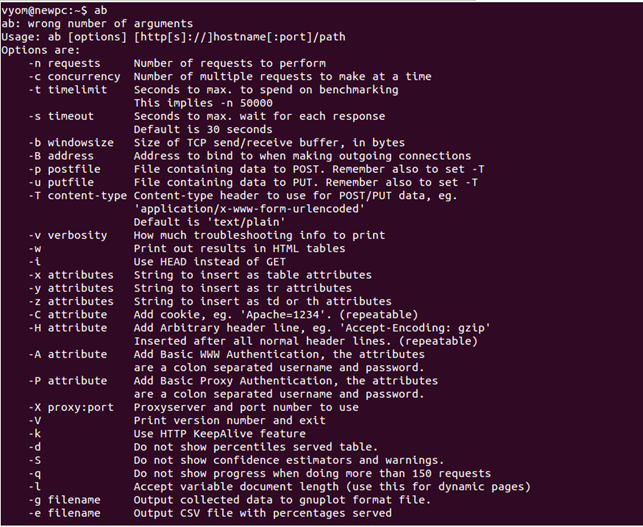Table of Contents
If you are a webmaster, you may often be concerned with the performance of your web applications. You might ask questions like, “how do I perform load testing of my application?” or “will my application be able to handle a lot of users?” In these cases, Apache Bench can be a great help. Apache Bench is a free and open-source tool to measure the performance of a web server with a simple, easy-to-use command-line interface; it can help you understand how your current Apache installation performs.
In this tutorial, we will show you how to install and use Apache Bench on Linux.
Step 1 – Install Apache Bench
Apache Bench is a part of the Apache webserver package, so you don’t need to install the Apache Bench if the Apache Web Server is installed on your system.
For Ubuntu/Debian operating system, install the Apache Bench tool with the following command:
apt-get install apache2-utils -y
For RHEL/CentOS operating system, install the Apache Bench tool with the following command:
yum install httpd-tools -y
You can display all options available with Apache Bench tool using the following command:
ab
You should see the following screen:

A brief explanation of the most commonly used options is shown below:
- -n: Specify the number of connection requests sent to the webserver.
- -c: Specify the number of concurrent connection requests sent to the webserver.
- -t: Specify the number of seconds the ab command should continue sending requests.
Note: Sometimes you may get a “connection timed out” error. The reason for this is your connection request blocked by a firewall or the Apache webserver wasn’t able to handle further requests.
Step 2 – Running a Stress Test
At this point, the Apache Bench tool is installed. Now,you can perform a stress test against your webserver locally or using the domain name.
Let’s perform a stress test against your Apache web server by sending 800 requests over 300 concurrent connections.
ab -n 800 -c 300 http://your-domain-name/
This will perform for 800 requests with a concurrency of 300 as shown below:
This is ApacheBench, Version 2.3 <$Revision: 1807734 $> Copyright 1996 Adam Twiss, Zeus Technology Ltd, http://www.zeustech.net/ Licensed to The Apache Software Foundation, http://www.apache.org/ Benchmarking localhost (be patient) Completed 100 requests Completed 200 requests Completed 300 requests Completed 400 requests Completed 500 requests Completed 600 requests Completed 700 requests Completed 800 requests Finished 800 requests Server Software: Apache/2.4.29 Server Hostname: localhost Server Port: 80 Document Path: / Document Length: 10918 bytes Concurrency Level: 300 Time taken for tests: 0.459 seconds Complete requests: 800 Failed requests: 0 Total transferred: 8953600 bytes HTML transferred: 8734400 bytes Requests per second: 1743.53 [#/sec] (mean) Time per request: 172.064 [ms] (mean) Time per request: 0.574 [ms] (mean, across all concurrent requests) Transfer rate: 19056.29 [Kbytes/sec] received Connection Times (ms) min mean[+/-sd] median max Connect: 0 6 7.8 0 20 Processing: 8 92 124.3 44 437 Waiting: 4 92 124.4 43 437 Total: 22 98 128.9 44 453 Percentage of the requests served within a certain time (ms) 50% 44 66% 50 75% 53 80% 56 90% 435 95% 445 98% 450 99% 452 100% 453 (longest request)
In the above output, you can see Apache has handled 1743.53 requests per second, and it took a total 0.459 seconds to serve the total requests.
Let’s perform another stress test against your Nginx web server and compare it with Apache result by sending 800 requests over 300 concurrent connections.
ab -n 800 -c 300 http://your-domain-name/
You should see the following output:
This is ApacheBench, Version 2.3 <$Revision: 1807734 $> Copyright 1996 Adam Twiss, Zeus Technology Ltd, http://www.zeustech.net/ Licensed to The Apache Software Foundation, http://www.apache.org/ Benchmarking localhost (be patient) Completed 100 requests Completed 200 requests Completed 300 requests Completed 400 requests Completed 500 requests Completed 600 requests Completed 700 requests Completed 800 requests Finished 800 requests Server Software: nginx/1.14.0 Server Hostname: localhost Server Port: 80 Document Path: / Document Length: 10918 bytes Concurrency Level: 300 Time taken for tests: 0.184 seconds Complete requests: 800 Failed requests: 0 Total transferred: 8930400 bytes HTML transferred: 8734400 bytes Requests per second: 4354.95 [#/sec] (mean) Time per request: 68.887 [ms] (mean) Time per request: 0.230 [ms] (mean, across all concurrent requests) Transfer rate: 47474.91 [Kbytes/sec] received Connection Times (ms) min mean[+/-sd] median max Connect: 1 12 7.5 9 32 Processing: 5 33 12.8 30 56 Waiting: 4 26 12.9 22 49 Total: 15 46 13.6 46 70 Percentage of the requests served within a certain time (ms) 50% 46 66% 56 75% 58 80% 60 90% 64 95% 66 98% 70 99% 70 100% 70 (longest request)
In the above output, you can see Apache has handled 4354.95 requests per second, and it took a total 0.184 seconds to serve the total requests.
You can see that Nginx can handle more requests than Apache. After comparing the result of both servers, you will get an idea of which one to choose for your web application.
Conclusion
In the above guide, we learned how to test web server performance with Apache Bench. You can now explore the Apache Bench tool and run it with different options to measure the performance of your webserver; try it today on VPS Hosting from Atlantic.Net!